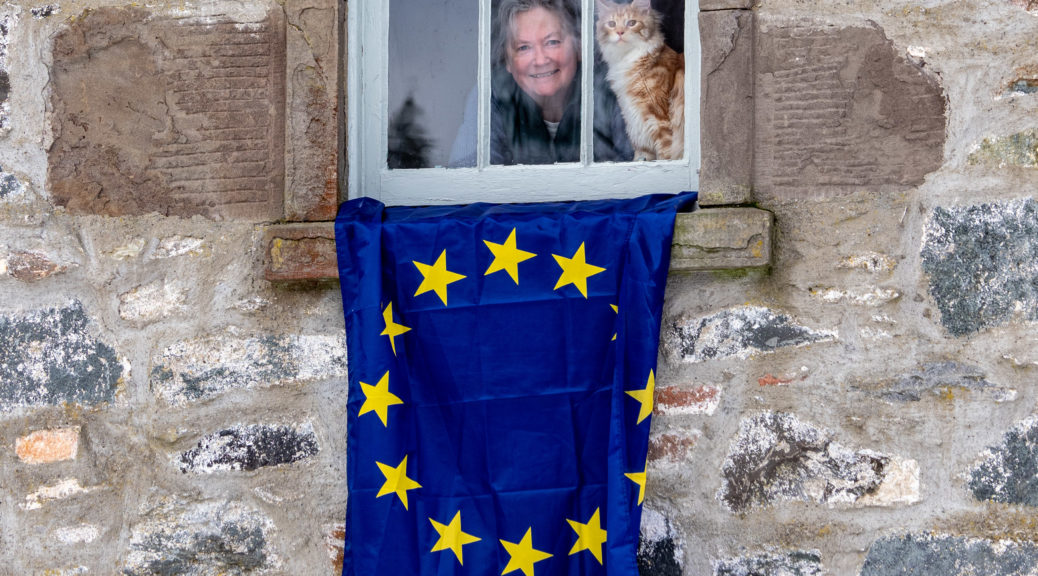I’ve lived more than six decades cheerfully identifying as English (where I was born), Scottish (where I was brought up and where I now live), British (when I couldn’t make up my mind), European (where I’ve spent a deal of my working life and where my greatest cultural resonance lies) and Human, in all other circumstances. And, for the most part, that hasn’t mattered a damn. My passport says I’m a British citizen and – again, mostly – that’s been fine, despite significant differences of outlook with most governments of my lifetime. Continue reading The Sound of Crowing in the Dark
Tag Archives: scotland
The Wrong Lizard
“It comes from a very ancient democracy, you see. . . .”
“You mean, it comes from a world of lizards?”
“No,” said Ford, “nothing so simple. Nothing anything like so straightforward. On its world, the people are people. The leaders are lizards. The people hate the lizards and the lizards rule the people.”
“Odd,” said Arthur, “I thought you said it was a democracy.”
“I did,” said Ford. “It is.”
Tactical Scotland (Redux)
TL;DR version [Updated with figures from the YouGov polling of 12-16 May]: If you’re looking for the best possible balance of pro-EU MEPs from the current Scottish List for the May 2019 EU Elections, the tactically smart thing to do is for the current voting intentions for the SNP, LibDems and Greens to hold up, and for any further defections from Labour or Tory to go to either the Scottish Greens or SNP (in that order of preference). Continue reading Tactical Scotland (Redux)
Tactical Scotland
[Update]: According to the latest YouGov poll, the swing to the pro-EU parties from the Con/Lab relics has been even bigger than I’d allowed for in this analysis. So head here for the latest pro-EU Scottish tactical voting recommendations. My previous recommendation was to swing to the SNP, but the figures now suggest that LibDem voters should stay where they are, and that any new swing voters should head for the Scottish Greens or indeed the SNP.
Voting based on the YouGov/TheTimes poll from the end of April would translate to 3 seats to pro-EU parties, 2 for pro-Brexit/anti-EU parties (1 Brexit and 1 Conservative) and 1 for Labour (whatever they are) – the d’Hondt model used in Great Britain is pretty robust in that regard, favouring smaller parties as the count progresses.
A tactical voting model that favoured the SNP at the expense of the Lib Dems and Change UK and the Brexit party at the expense of the Tories and (to a lesser extent) Labour, would give the Scottish MEP list 4 SNP seats, 1 Labour and 1 Brexit, a majority of 3 or 4 for pro-EU candidates, depending on whether Scottish Labour was neutral or pro-EU.
A tactical voting model that favoured the smaller parties (some Conservative and Labour to Brexit and Remain vote from Conservative, Labour and SNP to the LibDems, Scottish Greens and Change UK) would also give four seats to pro-EU parties (two SNP, one Green, one Lib Dem) but would lose Labour its seat, give the Conservatives one and make no difference to the one seat that the Brexit Party would have, thereby reducing the Pro EU majority on the list from 3 or 4 to 2.
There’s been much speculation about the pro-EU parties combining their lists (I think it’s too late for that now). However, changes to the list where the smaller parties came together to combine their lists (LibDem + Change UK, LibDem + Change UK + Scottish Green, then Brexit and UKIP combining votes) actually makes no difference to the overall outcome in terms of Pro/Anti-EU representation. What it would do is gain the centrist alliance a seat at the expense of the SNP.
An alliance of Change UK and the LibDems, using the YouGov figures, would likely achieve no net change: they’d gain a seat at the expense of the Greens.
However, the Scottish Greens on their own have at least a chance of a seat on their own (but only within a 5% sensitivity analysis), so their incentive for cooperation is perhaps limited. As a still largely issue-driven party, their vote is probably also less susceptible to tactical defection.
Now for the detail… Continue reading Tactical Scotland
Brexit Local
Health of Government Warning: this is an intensely political post. But it is not a party political post. And, yes, it’s about Brexit, two years after the referendum. Mostly though, it’s about the integrity and principles of politicians, and of our local MP in particular.
Still here? I commend you…
Brexit and other Fantastical Beasts
In two days, we elect a government. In the recent history of things, we’d normally be following our historical party affiliations, where a small number of marginal seats tip the balance between parties who pivot around a vaguely centrist axis where, whatever the outcome, most of us can live with it for another five years, the while employing the traditional British relief valves of dark muttering, sarcasm and cynicism. And so the world turns.
But not this time. This time, the stakes are far greater than a short-term opportunity for an elected government to tinker with the parameters of policy, income, debt and stimulus. This time, the stakes are no less than the future of both the UK’s place in the world and, as a consequence, the future of the UK itself. This is an election whose ramifications will play out, not over a five-year term, but over generations.
Renovation of the Year
Yes, really. We’ve been judged, voted upon and are winners of the 2014 Daily Telegraph/Homebuilding & Renovating UK Renovation of the Year. Which is nice and we have an impressively heavy glass trophy and some rather nice photographs by Nigel Rigg to remind us of this.



